- Home
- David Guterson
Problems with People Page 8
Problems with People Read online
Page 8
“We should make up for that,” Les advised. “Let’s check out whatchamacallit. ‘Feedback.’ ”
“God!” she answered. “Great idea!”
Their mirth endured. They only got control of it outside the Nash’s door. A hole in the wall, yes, but inside, it meandered. Around a first corner, still swimming, she felt quieted. They stood before a wall plaque, reading about Hamish:
HAMISH MCADAM
Hamish McAdam was born in Dillingham, Alaska. His father was a bush pilot, his mother a state legislator. McAdam exhibited an early mathematical precocity and an interest in daguerreotype photographic process. As a student at the Brooks Institute in Santa Barbara, he wrote extensively on the daguerreotype revival. In 1984, McAdam introduced his daguerreotype portraiture in Carmel, launching his career as a photographic artist. His work has since appeared in numerous publications, including Dwell, Flaunt, and Photograph magazine. Currently, McAdam teaches photography at Grosvenor College.
They rounded a second corner. Now the photographs came into view, hung against desiccated if well-cleaned brick. Les went immediately to scrutinize one, while she stayed behind, reading about “Feedback”:
FEEDBACK
“Feedback” is a study in infinite regress as it relates to self-reference. Consider, for example, a Morton Salt box, with its image of a girl beneath an umbrella, walking in the rain and carrying, in the crook of one arm, a Morton Salt box. The image both perturbs and intrigues us with its suggestion of a receding infinity.
In audio feedback—a microphone too close to a loudspeaker—an ear-piercing screech comes seemingly out of nowhere. A vicious circle has been set up. Sound entering the microphone is enlarged by the loudspeaker; this larger sound is picked up by the microphone, which transmits it to the loudspeaker, which…
Video feedback conforms to the same principle. A camera, connected to a monitor, is rigorously pointed at it, so that the two “experience” each other. Here again we find an infinite regress and an apparently endless self-reference. In “Feedback,” this phenomenon is subjected to extended exploration via focal point, contrast, and human intervention—specifically, the interposing of human facial expression. It is a way of looking, ultimately, at “self.”
—Hamish McAdam
She looked for forty-five minutes. In each photograph, Hamish had turned his camera on a monitor, and then, between them, interposed a human subject. Faces, eternally multiplied, became helical, or spiraled, or a hub for spokes that were also faces, or like the petals of a flower, but these visual complications only served to clarify expression—perturbation, depression, distress, rage, admonition, mockery. Hamish, whose daguerreotype days appeared to be over, shot in bald and garish light. His people were flagrant. You could see all their blemishes. He exposed them as assailed, as vulnerable.
She had the postmortem with Mark in the midst of her hangover. It was Thursday, a little warmer, and raining heavily. There would be no walking this afternoon. Behind Mark, on his credenza, a photograph of him and his wife looking like the Republicans they were on vacation in Mexico; another of the Mitchell family taken in a studio against a dark-blue backdrop. Mark handed her a copy of his evaluation, which she folded, unread, and slid into her bag. His actual subject: Clement Grimaldi’s tearful objections to the excising of Drawing III from the curriculum. Not a judgment, he added. Instead, by the numbers. No class in the building had lower enrollments. Clement could be emotional, he was emotional, he was recently divorced, he’d been ill with a MRSA infection, he took things personally, Clement was an artist. Mark clicked his pen a few times as he spoke. “What do you think?” he asked her. “You’ve been in this building for a long time.”
She knew what to say. She said, “I’m not sure what being an artist has to do with it. Clement is a friend of mine. I like and respect him, but he has a hard time with reality. I agree—he takes things personally.”
She thought of something. “Speaking of artists,” she said, “Les and I went to the Nash yesterday to see Hamish McAdam’s photographs. Remember Hamish? He’s teaching somewhere”—she had forgotten where—“I would guess low-residency.”
“Not low-residency. He’s at Grosvenor College.”
“I wonder how he got in front of students again.”
“Well, we certainly did what we could to help him. Oh,” said Mark, “that stuff. Yeah. It went nowhere, contrary to … hearsay.”
She didn’t answer. Mark took it as an invitation. “We even tried to bring him back,” he said. “Wouldn’t do it. Fortunately, he didn’t bring suit against the district. Not that he would have won, necessarily, but it could have been a much bigger hassle.”
“How so?” she asked.
“False allegations. Admitted to. In writing. By a girl I’m not going to name—she made an error. I thought faculty knew all about this,” said Mark. “I assumed you knew. Nothing,” he stressed. “Hamish never did a single thing wrong. Other than being a little … different.”
That night she told her husband about Hamish. They were in bed with books; he was about to pull the beaded chain on his lamp. He listened to her story without interruption, and then said that maybe she was obsessing about nothing and that probably, in the end, there’d been little or no harm. Why do you do this to yourself? he asked. Is it going to make the situation better? A situation—his real point—that wasn’t even a situation? The guy in the park had probably forgotten it—probably forgot it within a few minutes. It didn’t even exist, her husband suggested, except as thoughts in her head.
On Friday, she handed back the American civil rights movement quizzes and the set of Jim Crow era essays. The last bell of the week finally rang. She sat down and looked at the weekend weather, the starting times of movies, the hours the pool was open for lap swimming, restaurant dinner menus, and her retirement portfolio. Should institutions of higher learning be allowed to use race as a factor in determining admissions? Why or why not? She put those essays in her bag with dread about the work it would take to respond to them—to make comments, give feedback, give grades. Then she remembered that she’d forgotten about Hamish, had forgotten about him in the course of the day. Was that good or bad? She couldn’t say.
Hot Springs
Eleven months out of twelve, the judge ignored being Jewish. Then Christmas slid into view, and for a while he was reminded of it. People who knew he was Jewish would say “Happy Hanukkah” in lieu of “Merry Christmas,” and though he wanted to retort, “You don’t understand; I’m an agnostic who has no more to do with Hanukkah than you do,” he never answered anything of the sort. But still, Christmas forced his hand to the extent that December was his default vacation window. He and his wife, yearly, went somewhere balmy to wait out the season. Each November, they called their grown children—who had children of their own, Christmas trees, and colored lights—to repeat that December was a low-fare month for flights to sunny climes, and that it conduced to the judge’s court schedule to mark off vacation time with annual consistency. Then, a few weeks later, away they went until just after New Year’s, by which time Seattle had returned to normal in the sense that a nominal Jew like the judge could go for weeks without thinking about his birth religion.
But this year was different. Instead of winging off to a tropical locale, they were driving to Harrison Hot Springs in British Columbia, where Christmas was sure to be as omnipresent as it was at home, and—even more unusual—they had in tow the judge’s parents, who were too elderly to handle airplanes anymore but who were great at long-distance travel on interstates because, he thought, of the steady, unchanging rhythm. His father, who was spindly and had a dire need for legroom, rode beside the judge in the front seat, oblivious, as always, to fields, towns, and mountains—to everything in the landscape—while his mother, wedged into the back beside the judge’s wife, nattered on about herself: “I’m going with my quilt group on a quilting retreat during the third week of January, but I have to have a cyst removed from my neck the week b
efore … walked downtown from his office and had lunch with … we went into the Old Navy store because of Dina’s niece’s daughter’s birthday … tell you what Roberta said about me last … reminded me of me because she’s so …” His father, the judge saw for the thousandth time in his life, hung on his wife’s every word and seethed. Behind the wheel of his Civic Hybrid, driving toward Canada through midmorning rain, the judge seethed about her, too, mostly while displaying a cheery face, though sometimes the best he could do was to feign impassivity or act as if immersion in driving prevented him from nodding in the rearview mirror to acknowledge his mother when she demanded it. She’d say, leaning forward, “Don’t you agree with me?” and he’d pretend, absorbed in interstate perils, that her question wasn’t aimed at him.
“Your sisters have abandoned me,” his mother insisted, near Conway. “Don’t you agree? Don’t you think so, too?” And he checked a side mirror, purse-lipped but provoked, then changed lanes as if doing so was essential.
“Don’t you agree? Your sisters? Hello?”
At which point he looked in his rearview mirror and said, “I don’t know.”
“One is in South Africa and the other in Los Angeles,” said his mother. “Isn’t that right?”
“Yes.”
“So you agree with me.”
He didn’t answer. His mother said, “Well, that’s why your father and I had six kids. Oh boy, oh boy! We were sure busy, weren’t we, dear?”
“Yep,” said his father.
They approached the border. By the time the judge had answered the agent’s questions, zipped up his window, and rolled a little north, his mother had a fresh but familiar enthusiasm: “Handsome,” she said. “That fella in the booth? My God, he was so handsome!”
With a glance, the judge checked on his father, who said, “From this point, the border, it’s I think about an hour if—”
“You’re changing the subject,” his mother told him. “I want you to comment on that handsome border fella. Didn’t you think he was handsome?”
“Yes.”
“He could have been a model.”
“Yes,” his father repeated.
“A handsome, handsome man. Don’t you think?”
Once again the judge feigned interest in the road, as if rain and traffic called for all of his attention. His father said, “I didn’t really look.”
“You didn’t?” his mother asked. “He was unusual for a Canadian in that his skin was an olive tone. He might have been Greek or Italian—handsome! You know what I dislike about Canada?” she added. “They don’t really have minorities here. They don’t have the blacks and Hispanics like we do. Everyone here is lily-white. Everyone here is a WASP.”
Time to speak up—he had to; this couldn’t stand. He put a hand to his rearview mirror and said, “You’re sitting next to a white Anglo-Saxon Protestant, Mom. My wife. Your daughter-in-law. For whom ‘WASP’ is a derogatory term.”
His mother leaned forward and put a hand on his shoulder. “ ‘WASP’ isn’t derogatory,” she said. “It’s a description. It describes. Don’t you know that?”
“No,” he said. “I don’t know it. ‘WASP’ is derogatory.”
For the next hour—until they reached the hot springs—he regretted having broken a rule about his mother, his own three-part mantra: not worth it, you lose, keep your mouth shut.
There was snow on the ground at Harrison Hot Springs, or the remains of snow, a patch here or there, eroding to slush beneath the rain. Fortunately, they’d reserved ground-floor rooms with sliding glass doors, only steps from the adult pool, which boiled and steamed like a cauldron and at the moment steeped a dozen or so couples. Bathers came and went in white terry-cloth robes, padded along the covered walkways in zoris, toweled off in the frigid air, and knoodled in furtive corners. They were mostly Japanese—young couples with good haircuts, fashionable—engaged in misty giggling, teasing, and grappling while in easy reach of poolside drinks.
The judge, after putting on what his father called “swim trunks,” prepared his own poolside drink—whiskey and water in an aluminum water bottle—and told his wife that, contrary to her repeated assertions on the matter, she looked fantastic in a bathing suit. “Right,” she said, then in a well-knotted bathrobe left for the indoor round pool since it was the warmest on the premises at 104 degrees. The judge tried his drink, knocked on his parents’ sliding door, waited for them to do the things they always did before they went out—use the bathroom, take pills, discuss footwear, discuss food—and then, because the patio was rain-slicked, he took his mother by one arm and his father by the other and led them to the steps, with sturdy rails, that gave access to the adult pool. Stoutly, on wide and dimpled legs, hands on her hips, his mother waded forward while his father, after a spate of preparatory heavy breathing and a few stated hesitations—“Oh boy, this is hot”…“Not my cup of tea”—immersed his drooping frame at last.
“Okay,” said the judge. “I’ll be right over there.” He pointed. “In the pavilion.”
“Go,” said his mother. “The two of you deserve some lovey-dovey time.”
The judge gave a little farewell wave and, carrying his water bottle, went into the pavilion and hung his robe on a peg. Finally—after a day of battles, hassles, and irritations—he parked himself, with a sigh, in the water beside his wife, whose cheeks looked flushed, even scalded. “Your mother’s in extra-fine fettle,” she observed. “On a roll. In her element. Long drive with captive audience.”
“Sorry,” said the judge.
“Of course she meant ‘WASP’ as an insult—obviously.”
“It’s true,” said the judge. “But let’s take the high road. There’s no point getting into it with her.”
He unscrewed his water bottle. The pool pavilion, lit by wall sconces against the winter dark outside the glass, was hushed and steamy and, like the adult pool outside, had a libidinous effect on bathers. Here, too, were couples at play. They made the judge feel pleased with his life, and in particular with his wife, who at fifty-four did look fantastic in a bathing suit. She was perennially a beauty—a shiksa, as his mother put it—shiny, golden, smooth-skinned, trim. The judge put an arm around her waist.
An hour later, showered and dressed, they sat with his parents by the resort’s grand fireplace, the judge and his father in side-by-side armchairs and his wife and mother at one end of a sofa, where they paged through a coffee-table book called Great Resorts and Lodges of North America. Couples passed on their way to dinner, freshly groomed and neatly attired. On one side of the hearth stood a lit and tinseled Christmas tree, and on a nearby table a diorama depicted a snowy New England village circa 1925, decked out for Yule and inhabited, largely, by busy shoppers and frenetic children. Piped-in, if watered-down, carols played, and a swag of holly and winking lights traversed the mantel. The judge’s father noticed none of it, preferring to rehearse, with the judge, their schedule: “Dinner at eight-fifteen, breakfast tomorrow at nine, around ten or ten-thirty this walk your mother keeps talking about so she can look into the shops and so forth, then—”
“You know,” said the judge’s mother, “it really drives me nuts when you do that all the time. Try to enjoy right now for once, will you? Stop talking about your calendar every second.”
“It’s a little after eight,” his father replied. “Shouldn’t we go now? Our reservation is for eight-fifteen.”
Another couple approached. The man, bald in an exacting way, head shaved to a polished sheen, wore a plaid vest under a jacket stretched taut by a swell of hard belly fat. The woman, though silvered, didn’t quite pull off patrician; her Scottish knitwear was elegant enough, but her makeup lacked subtlety. They were nevertheless, both of them, aspiring to baronial, which provoked the judge’s mother: “Excuse me,” she said as they stood with their backs to her, warming their hands and murmuring to one another. “Are you enjoying yourselves there by the fire?”
The man turned and said, “Why, yes, we a
re, thank you. Thank you for asking. Where are you from?”
The judge’s mother turned a page of her coffee-table book and said, “No. I mean, what I mean is, would you move, please? Where you’re standing right now you’re blocking the fire. And we were here first.”
The baron and the baroness glared, then stepped left in tandem. “Sorry,” the judge said to them, only too aware that his mother looked and sounded like a Jew. “No big deal. We’re heading off to dinner anyway. The fire’s yours. Please, enjoy.”
“The fire is communal,” said his mother. “It’s meant to be shared. No one has the right to dominate it like that. It’s everybody’s.”
“Forgive us,” replied the baron, with thick irony. “You people have a nice evening if you can.” And with that he saluted the judge’s mother both combatively and dismissively, took his baroness by the elbow, and fled at a stately pace.
“And you, too,” called the judge’s mother after him. “Have a very, very nice evening!”
At eight-fifteen the judge’s party sat for dinner in the Copper Room. Here, as in the lobby with its massive fireplace, Christmas was old-fashioned, fussy, and conspicuous—a tree, strung lights, garlands, seasonally accoutered staff, piped-in carols, gratis mulled wine, and a menu insert turned toward Yorkshire pudding and cranberry conserve. “Goyishe and hoity-toity,” said his mother in a hushed tone, lest she goad into action the Copper Room’s anti-Semites. “Just look at these prices! This isn’t our world. This is for the goys, not us.”
“Enjoy it,” said the judge. “I’m paying for it.”
“Listen to Mr. King of England,” she said, studying her menu. “So ritzy, he’s paying. Hey, for years, sonny, we paid for everything. For everything, everything, everything!”
“Exactly,” said the judge. “So now it’s my turn.”
But inside he was steaming. His mother ruined everything; her mere presence was infuriating. He couldn’t stand the sour odor of perfume or her gnomish face—like a fat, dried apple—or her witchlike head of hair or her squat, rotund figure. Actually, he couldn’t stand anything about his mother—not at the moment, in the Copper Room, at Christmas. And he had to imagine his father felt this, too. In fact, he would have bet his entire fortune, however modest, that his father, moment by excruciating moment, experienced his wife of nearly six decades as a hellish, dogging, insufferable presence that, if you didn’t do battle with it, however subtly, would drive you to despair.

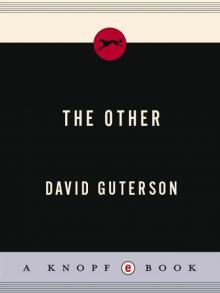 The Other
The Other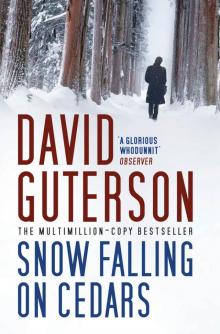 Snow Falling on Cedars
Snow Falling on Cedars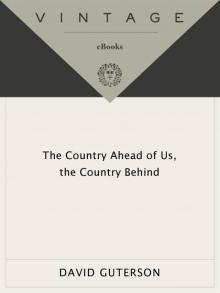 The Country Ahead of Us, the Country Behind
The Country Ahead of Us, the Country Behind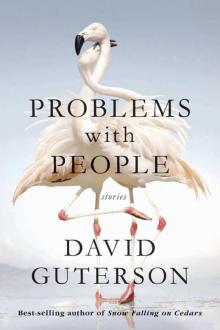 Problems With People: Stories
Problems With People: Stories East of the Mountains
East of the Mountains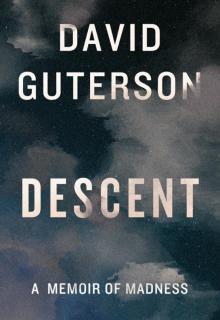 Descent: A Memoir of Madness
Descent: A Memoir of Madness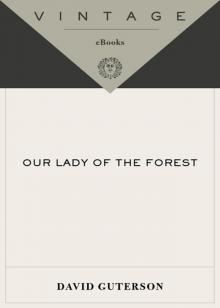 Our Lady of the Forest
Our Lady of the Forest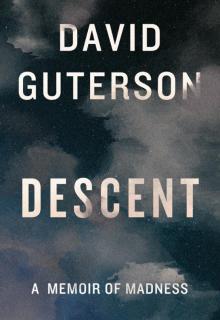 Descent
Descent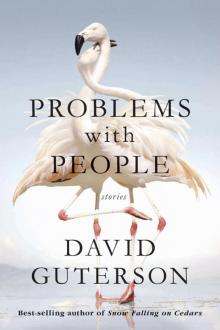 Problems with People
Problems with People